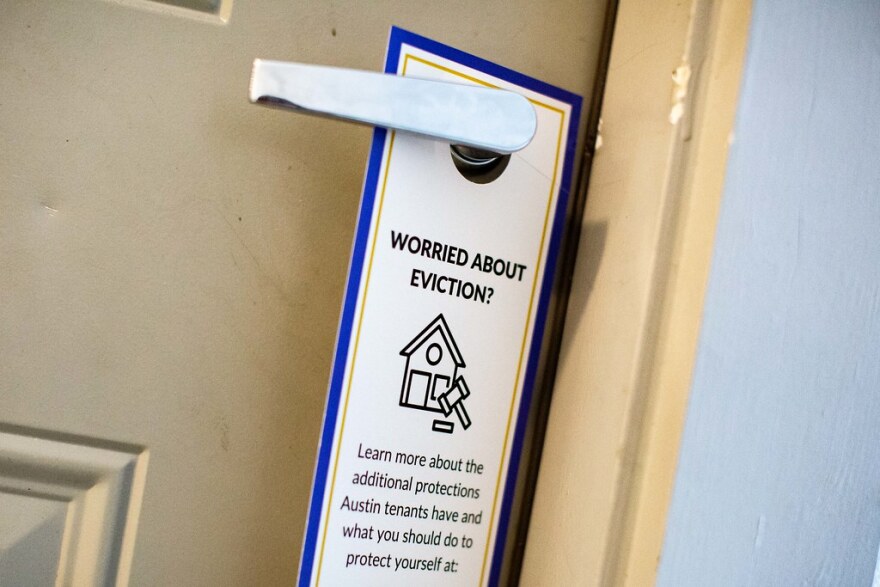Jarymar Arana grips a backpack outside an apartment complex in Pflugerville just after 8 a.m. on a recent Sunday. Arana doesn’t live here, but hundreds of people do, and nearly two dozen of them have had evictions filed against them during the pandemic.
“They have pending eviction cases with the Travis County courts,” Arana says. “So, what we’re doing is hanging door hangers, obviously respecting social distancing, with information about tenants’ rights and eviction protections.”
Arana is an organizer with Building and Strengthening Tenant Action, or BASTA. The group has spent the past two weeks placing 10,000 plastic signs on the door handles of renters living in buildings where landlords have filed evictions over the past few months. The door hangers, printed in English and Spanish, direct tenants to a website where they can read about current eviction protections.

“Eviction has always been kind of a violent process, a devastating process, because it does damage your credit, it damages your ability to have a choice in where you’re going to live next,” Arana says. “During the pandemic, obviously, there’s the added worry of people having to leave their homes during a pandemic, basically having to expose themselves to this virus. It could be an issue of life and death.”
The hope is that renters can have a clearer understanding of the slew of ever-changing eviction protections during the COVID-19 pandemic.
“There’s … some confusion around who can be legally evicted during this time and who cannot,” Arana says.
Some cities, including Austin, banned evictions early on. Then there was a statewide moratorium, then federal protections (only for people living in certain housing, though). At the end of the summer some of these orders expired, while others were extended or modified.
Figuring out if you were protected from eviction often meant understanding how the apartment you lived in was financed, or knowing which local or statewide bans were still in effect.
“Renters continue to be confused about the protections that apply to them,” said Christina Rosales, deputy director of the nonprofit advocacy group Texas Housers.
Then last month, the Centers for Disease Control and Prevention released an order that essentially bars landlords from evicting renters for not paying rent through the end of 2020. The order requires tenants to sign a declaration saying they’ve lost income or work hours and that they’ve done their best to pay part of their rent. They then need to give this declaration to their landlord.
But it was clear early on that some renters were unaware of this. And judges, who are not supposed to advocate on behalf of either side in a case, often did not explain the CDC order when an eviction case came up.
“Have you turned in a declaration?” Hays County Justice of the Peace Beth Smith asked a tenant at a virtual eviction hearing in September. It was days after the CDC order had gone into effect.
When the renter said no, the judge continued with the eviction. Three renters faced eviction that day and none of them had signed and given a declaration to their landlord that might have protected them.
Since then, the Texas Supreme Court has said counties should include information about the CDC order in the eviction notices tenants receive.
Some people who work with renters say people seem to understand the eviction protections better now. But Austin Tenants Council Housing Advocate Lesly Ramirez said she still gets calls of confusion.
“They’ll call and say, ‘I know I have rights. I just don’t know exactly what they are,’” Ramirez said. She also says she’s noticed more calls from Spanish speakers.
That's where people like Arana come in.
She put nearly 400 signs on doors that Sunday morning, climbing stairs and walking briskly down hallways.
“Being an organizer, one of the perks is that you don’t need a gym membership,” she joked.
The hope is that the information tenants receive will hold them through the year, when the CDC order is set to expire. Once that happens, there may be other local, state or national protections put in place and more information to decipher.
Got a tip? Email Audrey McGlinchy at audrey@kut.org. Follow her on Twitter @AKMcGlinchy.
If you found the reporting above valuable, please consider making a donation to support it. Your gift pays for everything you find on KUT.org. Thanks for donating today.







